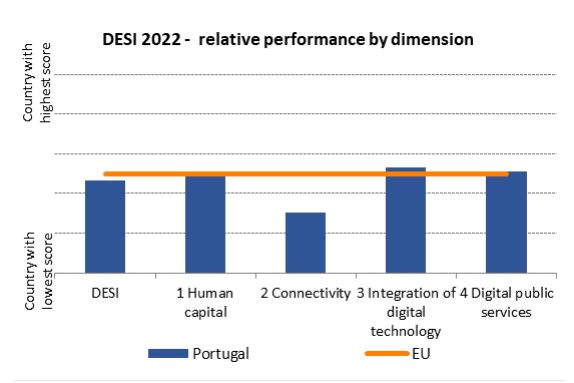HOME > PROGRAM > INCODE.2030
Integrated public policy initiative dedicated to strengthening digital skills
The “National Digital Skills Initiative e.2030, Portugal INCoDe.2030”, is an integrated public policy initiative, launched in 2017, which aims to promote digital skills. Digital skills are essential for the full exercise of citizenship, also acting as a facilitator of employability, by responding to the demands of the growing digitization of the labor market: a more qualified working population gives rise to new forms of work, new professions, and innovative products and, therefore, more robust and competitive economic activities. Digital skills are also of the utmost importance for the development of critical and multifaceted thinking, and for promoting inclusion, autonomy, well-being and social justice.
The Program of the XXIII Constitutional Government maintains and decisively reinforces the commitment to digitalization and the INCoDe.2030 as a means to achieve major national goals, providing that “The digital economy will continue to be one of the drivers of economic activity in the coming decades, It is essential to ensure that the Portuguese population will increasingly have the necessary and adequate qualifications to succeed in this digital transition, which implies a strong digital commitment to education, inclusion, digital literacy, information literacy and the promotion of development of the digital skills necessary for the full exercise of citizenship”. This Government assumes that “It is therefore important to reinforce the National Initiative for Digital Skills e.2030 (INCoDe.2030) and implement the PRR, with the objective of improving the level of digital skills of Portuguese women and men, thus placing Portugal at the same level as other countries. most advanced Europeans in this dimension and in a perspective extended in time”.
This reinforcement is echoed in the Organization of the current Government with the direct dependence of the Prime Minister on the Secretary of State for Digitalization and Administrative Modernization (SEDMA), according to Decree-Law No. of organization and functioning of the XXIII Constitutional Government that, by adopting the appropriate structure to fulfill the priorities set out in its Program, ensures that the Prime Minister ensures the formulation, conduct, execution and evaluation of policies for the modernization of Public Administration and for the digital transition, namely by calling to its dependence the coordination of the program «National Digital Skills Initiative e.2030-INCoDe.2030», in articulation with the Minister of Science, Technology and Higher Education, with the Minister of Education and with the Minister of Labour, Solidarity and Social Security.

What are digital competences?
The Portugal INCoDe.2030 initiative addresses the concept of digital competences in a broad manner. It includes the notion of digital literacy (i.e. the ability to access digital media and ICT, to understand and critically assess contents, and to communicate effectively), as well as the production of new knowledge through research.
The concept of digital competences is also linked to the use of digital technologies to design new solutions for different types of problems, the integration of interdisciplinary knowledge and data analysis, the intensive use of artificial intelligence, as well as of advanced instrumentation and communication networks and mobile systems, and the development and programming of cyber-physical systems. This involves hardware and software and extends the concept of ICT to electronics, automation and robotics.
Competences can be developed to different levels of depth and proficiency in each of these areas, depending on the level of qualification and goals set. These different levels are reflected in the type of measures that will be promoted in an inclusive and comprehensive way for the whole of society.
